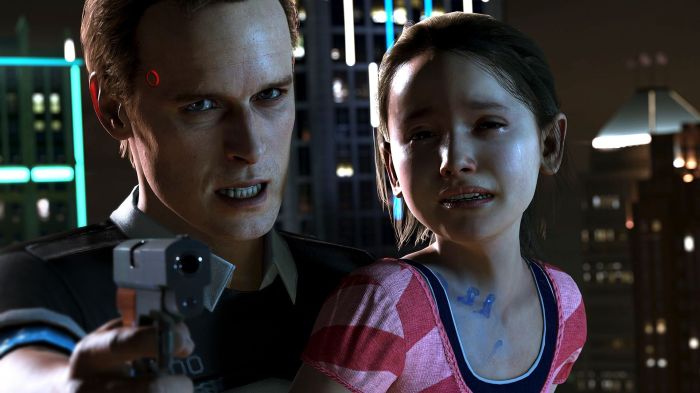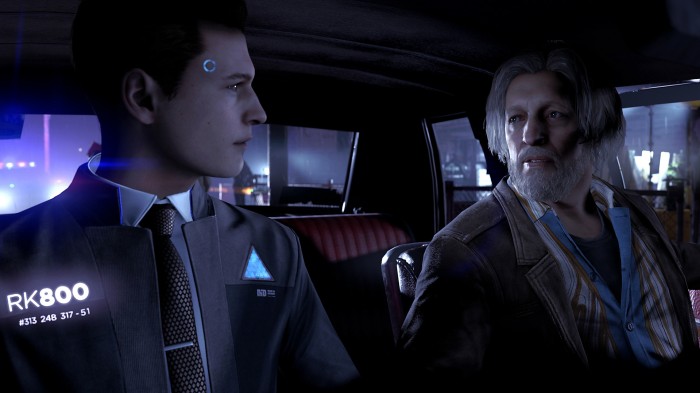I mostly enjoyed Heavy Rain but loathed Beyond: Two Souls, so Quantic Dreams’ games have been hit or miss for me. Needless to say, I wasn’t exactly excited to play Detroit.
However, I found a copy for rent at a local Red Box kiosk and since I wasn’t in the middle of anything else (having just finished God of War ) I bit the bullet and dove into David Cage’s latest narrative adventure. And it’s definitely a David Cage-ass game, albeit improved over the rest of his portfolio.

Despite it being the source of ridicule on social media and quite a few negative reviews, I (similar to Heavy Rain) mostly enjoyed it. The storytelling is a little clumsy and direct at times and it’s unapologetically influenced by some of the darkest times in American history; just replacing human slavery with androids and history repeating itself. Androids ride in the back of the bus, march in the streets for equal rights, and the player is even given “I have a dream”-like dialogue replies. The narrative is mostly on-the-nose and, hell, the entire point of the game is literally written in the subtitle.
You play as three separate android characters, each with their own storylines, that infrequently mingle with one another. Kara, a housekeeper, is owned by an alcoholic single parent who uses her to take out his drug-fueled aggression. Markus was the caregiver to an aging artist who finds himself framed for murder and joins the android rebellion. And finally, Connor is an android who has been paired up with the human detective *slash* alcoholic Hank (wonderfully played by actor Clancy Brown) in order to assist him in investigating a series of murders by sentient androids. Kara’s story ended up my favorite, with Connor and Hank’s buddy cop scenario as a close second. Markus’ rebellion story lacked the emotional punch of Kara or the moral gray area of Connor, and some of his motivations and major beats didn’t always feel earned.
The story is framed in an interesting manner and offers a TON of player agency by way of dialogue replies and heavy decision making. The characters they meet along the way have affinity meters, which unlocks new dialogue prompts and cutscenes when raised or lowered, and the end of each chapter displays a roadmap that shows your choices and how they affected the narrative’s flow. This chart also shows blank spaces, indicating missed opportunities or separate narrative paths that “could have” happened had you reacted differently. It certainly encourages multiple playthroughs and reminded me a lot of how enamored I became with Until Dawn; both playing it myself and wanting to watch others experience it in a different manner.

While the storytelling is mostly interesting and the game is overflowing with player choice, where it falters is in the actual gameplay. It feels nearly identical to 2010’s Heavy Rain, with player interaction being relegated to holding or mashing buttons or matching specific button prompts that pop up during cutscenes. For instance, instead of crawling along the floor using the left analog stick (which is otherwise always used to move your character) you’ll be prompted to press and hold the R1 button, followed by L1, then repeating as necessary until you reach your destination. This type of interactivity isn’t necessarily bad in theory, but it causes the on-screen action to screech to a halt until the button presses are met. It’s definitely jarring when a chase scene is stopped because I haven’t mashed X enough or held down three different buttons.
I don’t really want to talk about the narrative much since it’s such a huge part of the experience, but I do look forward to discussing it with others who have already finished the game. The game is replete with tense choices and their longstanding consequences, and there are plenty of ways to end up losing one of your favorite characters. I’m curious to hear how other stories played out in comparison to my own, in order to truly gauge how important these choices and consequences are, though.
Visually, Detroit is a mixed bag that certainly leans more toward good than bad. Important character models are stellar and shaped after real-world actors, with Blair Witch’s Valorie Curry, Grey’s Anatomy’s Jesse Williams, and Jane By Design’s Bryan Dechart portraying the main cast, while Lance Henriksen, Minka Kelly, and the aforementioned Clancy Brown headline the supporting roles. Although he’s mostly known for smaller roles in the film world, Evan Parke’s heartwarming portrayal of android guardian Luther is worth applauding as well. The voice work as a whole is quite strong, with only a few unfortunate deliveries by way of non-consequential NPCs and news broadcasters, and some primary character one-liners that come off spoken without context.

While characters in the primary speaking roles look great (and, honestly, some of the generic android models along with them), some of the human characters ironically have an uncanny valley look in their eyes. It’s generally the minor characters, but its inconsistency is a tad distracting at times.
The same visual inconsistency can be found throughout Detroit’s environments as well. Areas like the detective station and Hank’s home appear over sterilized and flat, while a long-abandoned amusement park and an under-the-radar deviant android hideout were seemingly given far more time under the microscope. Detroit never looks bad, or even below average. It’s just inconsistent.
Long story short, if you’re into these narrative adventure games it’s certainly worth the 10-or-so hours it takes to see it through at least once. I had a good (not great) time playing it but enjoyed the quality of the characters and the plethora of player agency more than I did controlling their physical actions.

If you’re familiar with David Cage’s hamfisted narrative approach, this is easily his best work. I like my narrative delivery to be a bit more subtle and less in-your-face, but Detroit: Become Human felt like watching a popcorn movie or binging a Netflix series. And that’s fine, really.
I wish it was more thematically unique and consistent on both a visual and narrative level. Problems aside, both glaring and minor, Detroit: Become Human is an ambitious, mostly interesting narrative adventure game that puts a strong emphasis on player choice, while still displaying the same gameplay flaws Quantic Dream has stumbled with since Indigo Prophecy released on the PS2 in 2005.
The game just LOOKS beautiful. My husband picked it up a few weeks ago, but he can’t seem to put Destiny away long enough to play it lol (and he’s kicking himself for it). I might pick it up and play before he does. The gameplay seems a bit odd, but I’d try to muddle through for the sake of the narrative.
LikeLiked by 1 person
It’s definitely gorgeous, but yeah, the gameplay bits aren’t that great. Let me know what you think whenever you or he get around to it!
LikeLiked by 2 people
I’m kind of laughing, because I started reading Alex + Ada today, and there’s a similar motif of android rights. I’m like, “Wait a minute…this is like that Detroit game!”
LikeLiked by 2 people
Pretty much, haha. Very similar, but Detroit’s writer is known for being too hamfisted.
LikeLiked by 2 people
I blazed through the first Ada + Alex and then bought the rest of the series on Amazon. I can tell I”m going to love this.
LikeLiked by 1 person
Definitely with you on the loathing of Beyond: Two Souls. Did you make it to the end?
LikeLike
I finished Beyond back on the ps3 before the remixed version released on ps4. It was pretty terrible.
LikeLike